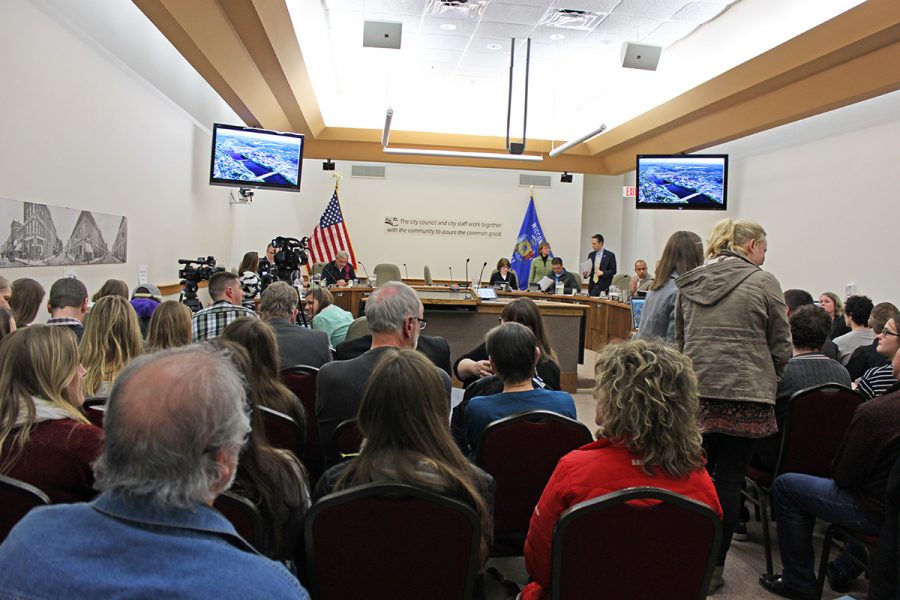Students speak out about proposed ordinance changes at City Council
Controversial “Public Good Order” ordinance was spotlight of Monday’s meeting
Photo by Kar Wei Cheng
Monday’s City Council hearing featured the collective thoughts and opinions of students and community members.
On Monday, dozens of UW-Eau Claire students and members of the community gathered in the council chamber of City Hall to participate in a public discussion regarding the proposed Public Good Order ordinance amendments. The chamber quickly reached capacity, and the overflow room rapidly followed suit.
The amendments to this ordinance — proposed by Jenessa Stromberger, assistant city attorney — were created with four primary intentions. The first is to outline new protocols for policing public disturbances. Second, the changes would work to limit physical public disturbance. The next purpose would be to outlaw excessive public intoxication. Finally, an amendment was added to control public and private transportation in relation to passenger numbers and drop-off destinations.
The public discussion kicked off with a presentation from Stromberger and Chad Hoyord, deputy chief of the Eau Claire Police Department. Stromberger and Hoyord outlined the main points and benefits of the proposed ordinance amendments, then took questions from the City Council members.
“Eau Claire has a significant problem with alcohol,” Stromberger said to the council members. “We want to change behavior.”
Stromberger cited USA Today, stating Eau Claire is the second drunkest city in the nation. She also discussed Eau Claire’s “higher than average” number of alcohol-related incidents. Hoyord backed these claims by sharing with the council that within the past six months, there have been an average of eight alcohol-related incidents per day.
“I cannot stress the need enough for a culture change,” Hoyord said. “I would be proud if our police department could assist in that cultural transition.”
With further prompting from the council, Stromberg and Hoyord discussed issues of over-consumption and underaged drinking, community complaints and the need for some sort of diversion program. Stromberg said she would be in favor of postponing the vote until May, as students would be more available for providing their own input.
Joseph Abhold, UW-Eau Claire’s dean of students, said he is in favor of the amendments but also wished to postpone the vote. While Abhold stated his desire for safe, inclusive and civil neighborhoods, he also said that the students of UW-Eau Claire deserve more inclusion in the decision making process.
“The vast majority of our students — the vast majority of the time — are doing excellent things in this community,” Abhold said. “A number of the issues that are happening in the neighborhoods around campus are not students.”
Many arguments in opposition of the ordinance amendments centered around issues of First Amendment rights and profiling. For many, the problematic wording of the Public Good Order is the primary concern. Multiple people pointed out that some of the phrasing in the ordinance is too subjective.
“Not since the vote on the Confluence Art Center, has there been a student movement as popular — and as exciting — as this one,” said Scott Small, UW-Eau Claire Student Senate intergovernmental affairs director, at Monday’s hearing. “This ordinance will negatively affect the safety of students in these neighborhoods.”
Small spoke on behalf of Student Senate at Monday’s meeting. In opposition of the ordinance, Small reiterated Senate’s desire for a postponement of the council’s vote, a restructuring of some of the points made in the ordinance and a voice within the process.
“Somewhere in the formulation of the policy, students were left out — forgotten,” Small said. “A policy that is written by the enforcers, instead of the ones being enforced, is not a policy that I want to see in Eau Claire.”

Madeline Fuerstenberg is a fourth-year journalism student. This is her eighth semester on The Spectator staff and she’ll miss it with all her heart once she graduates (if she graduates).











